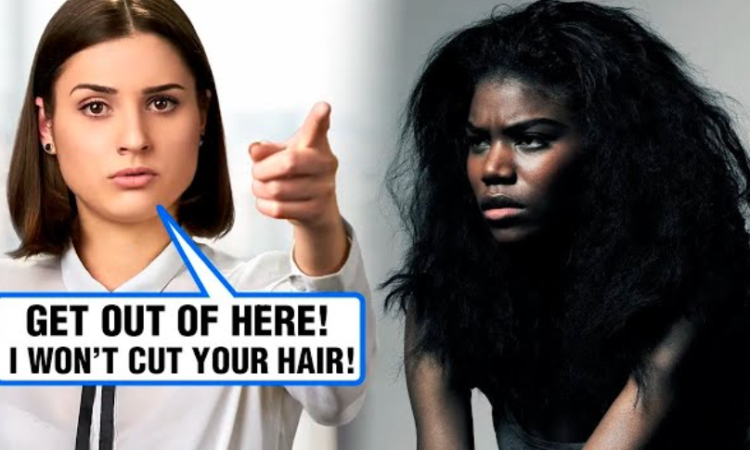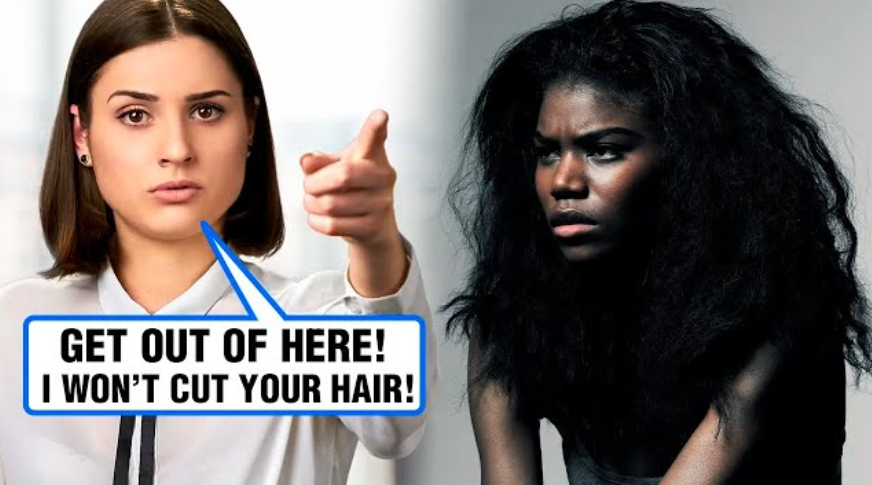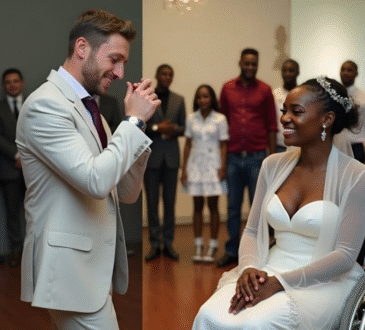I’m not going to cut your hair! Get out of here!”, hairdresser said. When she said your name

A black woman is kicked out of a fancy beauty salon for her appearance. But when she goes back and they find out who she was, everyone is shocked. You won’t believe what happened on a quiet afternoon.
Mary, a 42-year-old black woman, entered a sophisticated beauty salon located in the most elegant part of LA. Dressed simply but elegantly, she walked to the reception. The salon, known for its elite clientele, was exquisitely decorated with shiny mirrors and comfortable armchairs. Mary was greeted by the secretary, who informed her that due to the lack of staff that day, the salon’s owner, Helena, would attend to her herself as the other attendants were already busy.

“All right, I’ll wait,” said the woman. She sat down in one of the fancy armchairs and waited. Despite the wait, Mary felt excited as she knew the salon’s reputation as one of the establishments with the best hairdressers in the city. She was waiting patiently, her eyes roaming over the luxurious decor and observing the other customers who seemed immersed in animated conversations and fashion magazines.
While she waited, the woman picked up a magazine and began to picture what her new haircut would look like. She needed a change, something that reflected her recent professional advancement—maybe something modern but not too daring, she thought, looking at her reflection in the mirror on the other side of the salon.
Helena, the owner, was cutting a client’s hair while casting furtive glances at Mary. Her expression was a mixture of discomfort and hatred. She tried to maintain her usual professional composure, but something about the woman seemed to disturb her.
Mary, oblivious to her owner’s discomfort, continued to choose her new look and think about her work plans. “I think this salon is going to be perfect. It’s exactly the style I’m looking for,” she reflected, full of anticipation.
Helena finished with the customer and sighed deeply, as she didn’t want to deal with the black woman. She approached the reception desk, her professional smile hiding her true emotions, and asked the secretary who was next. The woman said that Mary was waiting for her. Then Helena said that she would take a short break and then get back to her appointments.
Mary almost got up, but when she heard about the break, she smiled and nodded, “All right, I’ll wait,” she whispered, although she was a little anxious about what would come next. The woman had no idea that this salon would change the course of her day in a way she could never have imagined.
After half an hour of waiting, Mary began to feel neglected. But something worse was happening. She noticed that after the break the owner had taken, she began to attend to the customers who arrived after her. They were promptly served, while the black woman remained forgotten in her chair, increasingly frustrated.
Determined to clarify the situation, the woman got up and approached Helena, who was attending another customer. Mary complained politely but with a tone of voice that showed her dissatisfaction. “I’m sorry, ma’am, but I arrived before these other people, and I’ve been waiting for almost an hour. Can you tell me when I’ll be seen? I have important things to take care of.”
Helena, busy with a haircut, barely looked up at the woman. Her response was rude and dismissive. “Oh, I didn’t even see you there. You’ll have to wait, dear. I’m busy right now.”
Feeling wronged, Mary insisted, “But you knew I was there when you said you were going to take your break, remember? Or are you just pretending?”
The salon owner’s response was even harsher and full of prejudice. She stopped what she was doing, turned to Mary, and said with a harsh tone of voice and an expression of contempt, “Ah, you’ll be waiting here all day, ’cause I’m not attending to you.”
The woman took a step back in disbelief, surprised and offended. She asked, “What? Why not?”
Helena, without bothering to hide her disgust, responded with an offensive and completely despicable comment, “Because you’ll break all my scissors with that hair of yours.”
The woman’s words echoed through the salon, attracting curious and shocked looks from the other customers. “Wow, how did she have the nerve to say that?” whispered some of the customers.
Mary felt humiliated and deeply hurt. She didn’t expect to face such discrimination and disrespect in an establishment that was supposed to be welcoming and professional. Helena’s comment not only affected her personally but also touched on a delicate and painful issue of prejudice that many black people suffer in their daily lives.
Helena, for her part, seemed satisfied with her cruel response, unaware of the impact of her words and the indignation they had provoked in the woman and the others present.
Mary stood there for a few seconds, as if processing what she had just heard, trying to control her emotion and decide what to do next. “How can you treat people like that? Don’t you know that you’re being extremely racist? Do you have any idea of what you’re talking about?” she asked, her voice full of indignation. “You have no idea who I am or what I’m doing here. What right do you have to say those things about my hair? That’s racist! That’s a crime!”
Helena, full of arrogance and with an air of superiority, replied without a hint of remorse, “I don’t care who you are. This is my establishment, and I choose who I want to attend to. And I definitely don’t attend to people like you. So get out of my salon!”
Customers and employees who until then had been watching the scene in silence began to murmur amongst themselves. Some, shocked by the crudity of her prejudice, exchanged looks of disapproval, while others tried to look away, uncomfortable.
“This is unbelievable! This is the 21st century, for God’s sake!” exclaimed one customer, clearly shaken. “I never imagined I’d see something like this.”
Mary, although wounded by Helena’s poisonous words, kept her dignity. “You’ll regret this,” she promised before turning to leave. “You have no idea what I can do.”
As the black woman was leaving, another customer stood up and said loudly, clearly disgusted, “I can’t believe I frequented a place with such a small and racist owner. I’m leaving, and I’m never coming back.”
Mary’s departure was followed by the awkward silence that fell over the place and those who remained. The owner tried to resume her work, but the atmosphere in the salon had changed drastically. The murmurs from the customers reflected a mixture of shock and disapproval. Some began to get up and leave the salon, showing solidarity with the woman.
Helena’s salon was no longer the same. The incident left an indelible mark on both the owner and the customers who witnessed the scene. Her discrimination and prejudice had been exposed, and the consequences were only just beginning to unfold.
About half an hour after being unjustly mistreated, the black woman returned to the luxury beauty salon. Only this time, she was accompanied by a film crew. With the cameras recording, Mary began to report what had happened and to speak with authority.
“I’m here at the St. Georgina beauty salon where I was discriminated against and humiliated. We’re going to
expose how prejudice is still present, especially among those places that think they’re so sophisticated,” the salon owner, the moment she laid eyes on that fuss at the entrance to her establishment, freaked out, and her customers were stunned by the scene.
“What are you doing here? Get out of my salon now! I told you you’re not welcome here!” shouted Helena, possessed with anger.
The black woman, without losing her composure, introduced herself, “My name is Mary Santor. I’m here to document the discriminatory treatment I’ve suffered. You will not get away with this.”
However, when she heard the woman’s name, the salon owner shuddered. The customers and other employees present were also stunned. Helena’s expression changed completely. “No, it can’t be! She is… the owner?” was terrified now. The name was known throughout the cosmetics sector, especially in quality hair products.
The salon staff started whispering among themselves, realizing the seriousness of the situation. They said in amazement, “Mrs. Santor, your products are incredible!” The customers whispered, “Oh my God! The owner kicked out Mary Santor? She’s screwed now! I just want to see how she gets out of this!”
Helena, at this point, completely desperate, tried to apologize because she knew that this woman was not just anyone. “Please, Mrs. Santor, forgive me. I didn’t know who you were. It was a terrible mistake. You’re more than welcome here. I’m really sorry for any inconvenience.”
Mary looked into the eyes of that hateful woman and replied with a firm tone, “Oh, so you are sorry now? You think that ‘sorry’ justifies your prejudiced and offensive behavior? Today, you not only humiliated me but also disrespected all your customers and the black community.”
The film captured every moment as Mary talked to those present, highlighting the importance of respect and equality in treating customers, regardless of their skin color or appearance. “I don’t know how anyone can say that my hair is going to break their scissors and think that I’m just going to forget about it, especially now that you know who I am. Do you really think I’m an idiot, lady? You offend me so cruelly just because of the way I look, and now you want everything to go back to normal?”
Helena, overcome by shame and regret, stepped back, realizing the extent of her mistake. The cameras continued to record, documenting the incident that would serve as a stark reminder against prejudice and discrimination.
“I… I’m going through some things in my life, and I… I was not myself today,” the owner tried to justify herself. “And you know what? I didn’t just come here for a haircut. I wanted to make you a proposal, but you just lost it,” Mary declared.
“What are you talking about?” Helena was confused.
It turns out that Mary Santor, the black woman who was brutally neglected at the luxury salon, was no ordinary client. She was a renowned entrepreneur in the world of hair cosmetics, especially known for her exclusive line of products for hair of all types, including, of course, afro hair. Her name carried significant weight in the beauty industry, representing quality and innovation. The Santor brand was a symbol of luxury and sophistication.
The woman had made the decision to personally visit several high-end salons as part of a marketing strategy to test and promote her new products—products that would be an exclusive fancy line. Those salons that were selected by her received not only high-quality products but also an opportunity to increase their reputation and attract more clients. In other beauty salons, the woman was greeted with great enthusiasm and respect. The owners were aware of the influence of her products on the market and were eager to establish a partnership.
“Mrs. Santor, it’s an honor to work with your cosmetics. They have transformed our salon and brought us many new clients. Everyone loves the results,” commented one of the owners, expressing his gratitude.
And so it went, one after the other. At Helena’s salon, however, the businesswoman’s experience was radically different. Her very presence there as a black woman was marked by prejudice and disrespect, something she never expected to find in a high-class establishment that claimed to be so sophisticated and renowned.
The owner’s attitude was not just a personal attack on Mary but also a reflection of a wider problem of racism and intolerance in society. But what nobody knew was why Helena was so disrespectful to her. The main reason, apart from the fact that she was a horrible person, was that the beauty salon owner was going through a turbulent time in her personal life. Her marriage of many years had ended in a very painful way. It had been in ruins for several years until the dissatisfaction built up day by day.
“You’ve become a bitter person, Helena. I no longer recognize the woman I married. In fact, you’ve always been like this; only now it’s worse,” said the husband, exhausted by the constant fights and disagreements over the fact that his wife was such a depressing and bad human being.
The final straw came when Robert, her husband, met Camila, a black woman with radiant beauty and a captivating personality. She made him happy in a way that Helena couldn’t anymore. Determined, the man filed for divorce, leaving Helena in a state of shock and denial.
“You can’t leave me for her! What will people think? Look at her! Are you going to leave me for someone like that?” screamed the woman, trying in vain to hold onto her broken marriage and feeling inferior for being dumped for a black woman.
The arguments intensified, and Robert, firm in his decision, made it clear that there was no more love between them and that he never cared about anyone’s skin color. “She’s better or worse. It doesn’t mean anything, really,” he said as his wife signed the divorce papers with resistance, still incredulous.
Even after the divorce, the salon owner tried to win Robert back, but he was already happy with Camila. Seeing them together, Helena felt a mixture of pain and anger. “How could he leave me for her?” she thought, letting prejudice and bitterness take over her heart. That’s why when she saw the businesswoman in her salon, these feelings of hatred intensified, and all the repressed anger and resentment came to the surface. Even though she knew she was wrong and that the woman in front of her had nothing to do with her personal life, the salon owner projected all her frustration and spite onto Mary, treating her with hostility and disdain, unaware that she was facing a renowned businesswoman in the cosmetics sector and that she had just lost the chance of an incredible partnership.
The repercussions of the incident at the luxury salon were devastating. The recording made by Santor and her team quickly spread across social networks and local media, exposing Helena’s discriminatory behavior. The community reacted with indignation and solidarity with Mary, while the salon’s image deteriorated with each share of the video. Customers who had previously frequented Helena’s establishment began to cancel their appointments and disassociate themselves from the salon. Partners and suppliers broke off business ties, and the flow of customers fell dramatically. Even her employees quit.
With no support from the community and her reputation ruined, Helena couldn’t resist. After a few weeks of struggling to keep the doors open, she had to admit defeat and close the establishment for good. The bankruptcy of the salon was a harsh lesson for that hateful woman about the consequences of her prejudiced actions and attitudes. She was forced to confront the reality that her discriminatory ideas had real and destructive consequences.
Meanwhile, Mary Santor has been hailed as an advocate for equality and respect. Her courageous attitude in exposing discrimination not only earned her admiration but also strengthened her position as a leader and influencer in the cosmetics sector. Her products, already popular, gained even more recognition and public trust, especially among those who value inclusion and diversity.
The attitude of this battling black woman showed that it is possible to fight against injustice and inspired many to raise their voices against discrimination. And if you liked this story, I’m sure the next video that pops up on your screen will move you too. Don’t forget to subscribe, give us a thumbs up, and activate the notification bell so you don’t miss any of our upcoming videos. See you in the next heartwarming story!




